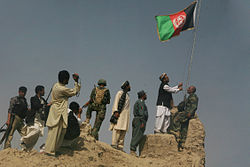Khanashin District
Khanashin
ریگ خان شین | |
|---|---|
District | |
 Flag raising over Khan Neshin castle, Rig District, after Operation Khanjar. | |
Location within Afghanistan[1] | |
| Coordinates: 30°50′N 63°29′E / 30.83°N 63.48°E | |
| Country | |
| Province | Helmand Province |
| Population (2012)[2] | |
• Total | 25,600 |
Reg (Khanashin) District is situated in the southeastern part of Helmand Province, Afghanistan along the Helmand River on its western bank. The population is 25,600[2] (80% Pashtun and 20% Balouch).[3] The main village is Khanashin.
The district is almost a desert and all the villages are along the Helmand River. The drought has extremely affected this district and its agriculture is ruined. The unemployment rate is 80%.
Agriculture
[edit]Actually, the district is known as the "Green Zone" due to its abundance of vegetation. Due to irrigation controlled by the Helmand and Arghandab Valley Authority[4] the Helmand River feeds into many canals that wind through the surrounding villages and bring water to this once desolate area, allowing local farmers to grow crops ranging from corn, okra, wheat, poppy, and marijuana. The unemployment rate is below 20% due to the surge in American troops in the region, bringing much needed safety and stability, allowing locals to move back into the area and re-open once flourishing business.[citation needed]
History
[edit]Reg District was, for much of the Afghan War, under Taliban control, until it was taken by ISAF forces in July 2009 during Operation Khanjar.
Natural Resources
[edit]Geologists also discovered rare earth minerals and niobium deposits in the Khanneshin area of Southern Helmand province with an estimated value of more than $89 billion[5]
References
[edit]- ^ "District Names". National Democratic Institute. Archived from the original on 29 January 2016. Retrieved 10 December 2015.
- ^ a b "Settled Population of Helmand Province" (PDF). Central Statistics Organization. Archived from the original (PDF) on 26 February 2014. Retrieved 10 December 2015.
- ^ "District Profile" (PDF). UNHCR. Archived from the original (PDF) on 27 October 2005. Retrieved 10 December 2015.
- ^ (pdf) The Helmand Valley Project in Afghanistan: A.I.D. Evaluation Special Study No. 18 C Clapp-Wicek & E Baldwin, U.S. Agency for International Development, published December 1983
- ^ "U.S., Afghan Study Finds Mineral Deposits Worth $3 Trillion". Bloomberg. Retrieved 2 May 2022.
External links
[edit]- Map of Settlements AIMS, May 2002


